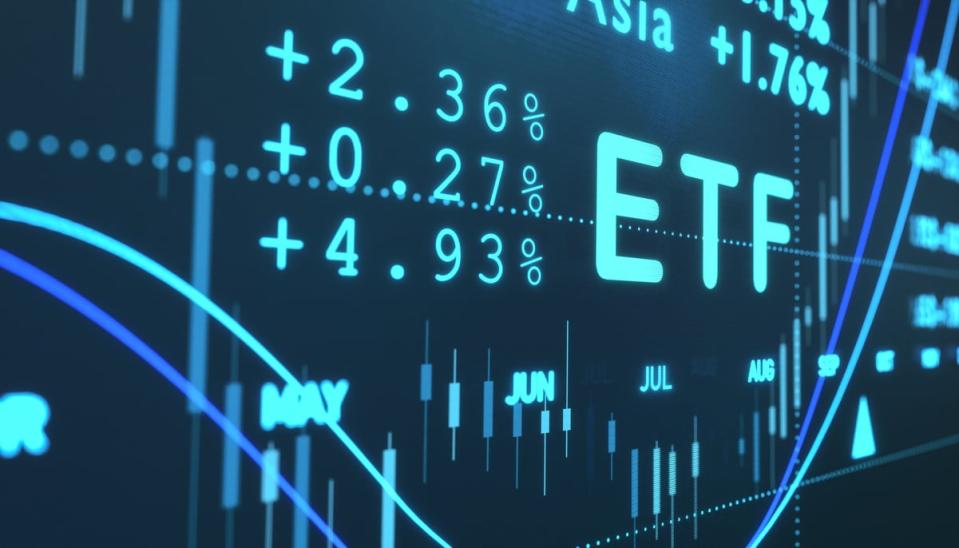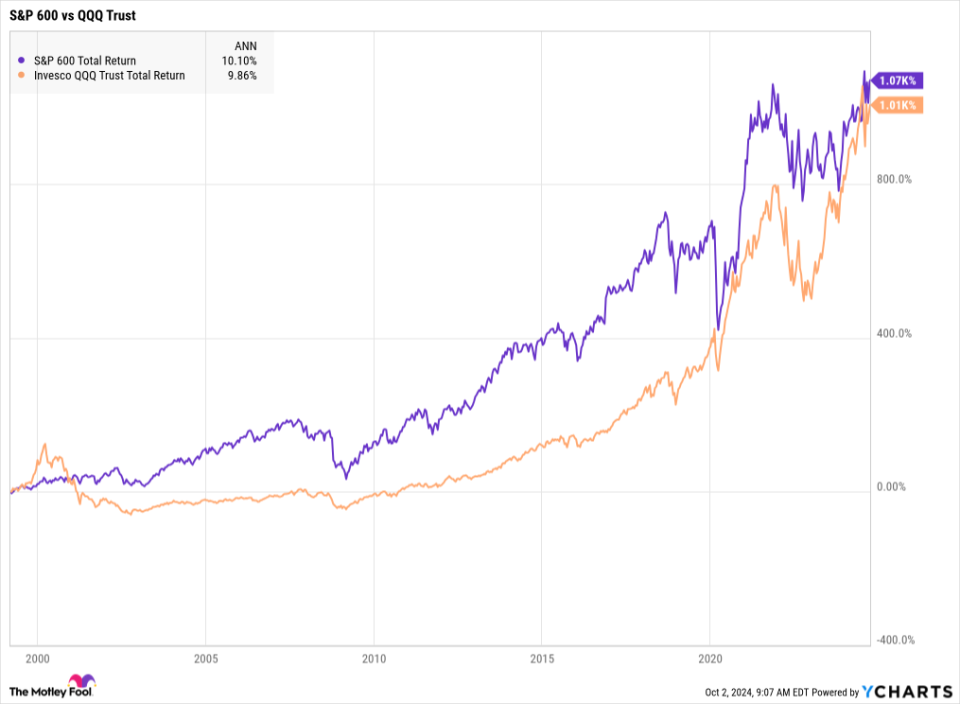Before You Buy the Invesco QQQ ETF, Here Are 3 Others to Try First
Investors looking for a quick and easy way to invest in the biggest and fastest-growing technology stocks in the world have flocked to the Invesco QQQ Trust ETF (NASDAQ: QQQ).
The ETF tracks the Nasdaq-100 index, which consists of the largest non-financial companies listed on the Nasdaq stock exchange. The Nasdaq is historically the exchange of choice for tech companies, so it should be no surprise that the majority of the index consists of technology stocks.
The Invesco fund has dramatically outperformed the S&P 500 index over the past decade, producing a total return of 435% compared to just 248% for the broader index. Still, investors should consider a few other options before putting their money into the popular ETF. Here are three to try.

1. QQQ's little sister
Invesco launched a new ETF in 2020 called the Invesco Nasdaq 100 ETF (NASDAQ: QQQM). It tracks the same Nasdaq-100 index as QQQ, but it offers investors a 5 basis point discount on the new shares versus the older ETF.
Where QQQ charges 0.20% of assets each year, the new Nasdaq-100 ETF charges just 0.15%. While that difference might not seem like much, it adds up over time, and there's no reason for investors to leave money on the table.
Invesco isn't offering a lower-priced ETF to investors out of the goodness of its heart. The company faces a lot more competition than it used to when it launched the QQQ Trust back in 1999. While it could easily rack up assets under management at any price in the early 2000s, it needs to offer much more competitive pricing today.
But there are billions locked into the older ETF. Investors with substantial unrealized capital gains may be willing to give up a few basis points in order to delay taxes by not selling. Additionally, the larger asset base makes the fund more liquid, which is attractive for big investors or frequent traders.
If you plan to buy and hold an ETF tracking the Nasdaq-100 index, though, QQQM is a no-brainer compared to QQQ.
2. A contrarian ETF focused on fundamentals
If you take a look under the hood of the Invesco QQQ Trust, you'll find a heavily concentrated portfolio. The top 10 holdings account for over 50% of the entire fund. What's more, many of the biggest holdings trade at high prices that aren't aligned with their fundamental financial performance.
One way to offset the high concentration and prices found in the QQQ Trust is to invest in the Schwab Fundamental U.S. Large Company ETF (NYSEMKT: FNDX). The ETF tracks an index that ranks and weights securities by fundamentals -- adjusted sales, operating cash flow, and cash returned to shareholders. The result is a portfolio with far less concentration and a lower overall price relative to the fundamentals.
The Schwab fund sports a P/E ratio of just 19.4 times compared to the Invesco fund's 39.5 times P/E. While it still has substantial stakes in some of the biggest names in the Nasdaq-100, it also integrates more value stocks into the portfolio. In fact, the focus on fundamentals tilts the fund toward more large-cap value stocks than the growth-stock-focused Invesco fund. But that diversification may pay off for investors in the long run.
The Schwab ETF sports an expense ratio of 0.25%, higher than the Invesco QQQ ETF. But the contrarian play could pay off for patient investors.
3. A small-cap value ETF
The biggest draw of the Invesco QQQ Trust ETF is its strong track record of returns. But one group of stocks has an even better track record than the large-cap growth stocks found in the Nasdaq-100. Small-cap value stocks have historically produced the strongest returns out of any segment of the stock market. The S&P 600 index, which tilts toward small-cap value, has outperformed the Invesco QQQ Trust ETF since its inception in 1999, despite the Nasdaq ETF's incredible performance over the past decade.
The Avantis US Small Cap Value ETF (NYSEMKT: AVUV) is one of the best ways to invest in small-cap value stocks. Instead of investing blindly in all small-cap stocks trading at a valuation metric in the lower half of a small-cap index, the fund screens stocks based on profitability to weed out those that may be value traps. It then invests in the remaining companies based on market capitalization. With over 700 stocks in the portfolio, no single investment makes up more than 1% of the fund.
While the Avantis fund is technically an actively managed fund, it shares many more characteristics with passive indexing than active management. The strategy has a great track record of performance based on the founder's previous experience at investment firm Dimensional. The Avantis fund has nearly doubled its benchmark index's return since its inception in 2019.
For long-term investors seeking exposure to a piece of the market that can offer stronger returns than the S&P 500 or the Nasdaq-100 for many years to come, the Avantis US Small Cap Value ETF could be a great option.
Should you invest $1,000 in Invesco QQQ Trust right now?
Before you buy stock in Invesco QQQ Trust, consider this:
The Motley Fool Stock Advisor analyst team just identified what they believe are the 10 best stocks for investors to buy now… and Invesco QQQ Trust wasn’t one of them. The 10 stocks that made the cut could produce monster returns in the coming years.
Consider when Nvidia made this list on April 15, 2005... if you invested $1,000 at the time of our recommendation, you’d have $765,523!*
Stock Advisor provides investors with an easy-to-follow blueprint for success, including guidance on building a portfolio, regular updates from analysts, and two new stock picks each month. The Stock Advisor service has more than quadrupled the return of S&P 500 since 2002*.
*Stock Advisor returns as of September 30, 2024
Adam Levy has positions in American Century ETF Trust-Avantis U.s. Small Cap Value ETF. The Motley Fool has no position in any of the stocks mentioned. The Motley Fool has a disclosure policy.
Before You Buy the Invesco QQQ ETF, Here Are 3 Others to Try First was originally published by The Motley Fool
